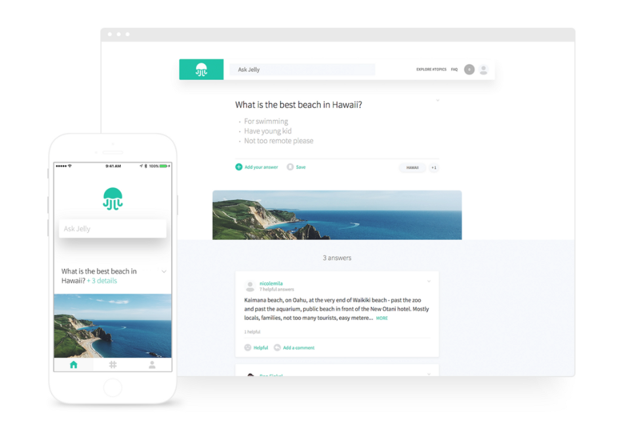Biz Stone’s Jelly Is Back As A Crowdsourced Search Engine
In 2013, Twitter cofounder Biz Stone released Jelly, a Q&A app that allowed you to crowdsource answers to questions, getting answers from your friends and friends of friends. The idea didn’t exactly take off, and the company opted to pivot away from the Q&A model and launch Super, a social networking app that also didn’t gain a ton of traction.
Now a little over two years later, Stone and his cofounder Ben Finkel are bringing a whole new version of Jelly out of beta, one that they believe will be much more successful.
“We learned a lot from the first time around,” says Stone. “We think we learned our lesson, and we think we’ve got the magic formula now. But of course, you never know if it’s going to work until you fail—then you know it didn’t work.”
The original version of Jelly was tied to your social identity, so all of your friends on the service could see each question you asked. That personal connection is one of the things the duo thinks made the original version unsuccessful.
“If you tie your social media identity to your searches, you’ll do a lot less searches,” says Stone. While asking your personal network questions is great, it also affects what you’re willing to search for. Imagine tweeting out everything you type into Google—chances are you’d do considerably less searches.
The new version of Jelly looks just like any other search engine you’ve used, and every search is done anonymously. You don’t even need to sign in to use the service. When you search, Jelly uses an algorithm to route your question to users who are considered knowledgable about the topic. They answer, and you get search results a step above what you might find on your average search engine. Even better, you can also browse through questions others have asked on the service and save those questions, so you see the responses as well.

“It turns out people really want to answer,” says Stone. He says that’s one thing they learned with the first version of Jelly. People who asked a question would often get 30 or more replies.
When you receive a good answer, you mark it helpful, which then adds to the respondent’s “helpfuls” number, which appears on each profile on the service, similar to a follower count on Twitter. That number is visible to everyone whose questions get answered, offering every user a street cred of sorts on the service, so people know who’s actually the one to talk to about bicycle repair or finding that perfect bottle of vino.
With the new Jelly, Stone and Finkel are fast-tracking questions to people who have “been there, done that,” with the hope of getting every question answered as quickly as possible—and, ultimately, with no wait at all.
“That’s the future of search. You ask a question, here’s your answer. Done,” says Stone. “That’s how it will work on Amazon Echo, and that’s how it will work inside a game in virtual reality. That’s how it should work on a mobile phone.”
In And Out In 10 Minutes
For now, the goal is to get each question answered in 10 minutes, which Stone and Finkel say is still better than what most of us get from our current search experience. More importantly, the answers you get need to be good ones.
“It might take you 13 seconds to ask a question, but on web search you still have to snoop around for the links, and search again, and try again, and click around. That’s time that accrues. We do like a dozen searches a day, and that builds up,” says Stone. “We’re saying ‘Just ask the question and then keep working or talking to your friends and we’ll just let you know when we get the answer.’ So we’ve actually saved you time. We saved you 10 minutes.” If you have follow-up questions, you can also ask the respondent more. Something that isn’t exactly possible with your typical search engine.
Currently all questions are routed to a human, but over time a computer might realize the question has previously been answered and offer you that answer immediately.
“The more you use it, the more we know about you, the better we can do a job of trying to match questions to you as efficiently as possible,” says Finkel. “It’s more about learning what people are good at answering or want to answer.”
Now to see if people want to use Jelly in this new incarnation.
Fast Company , Read Full Story
(27)














